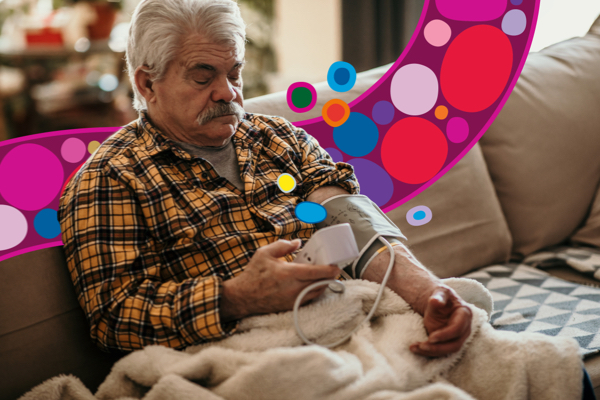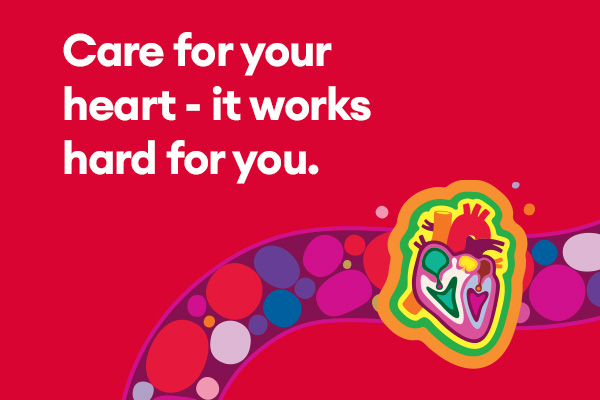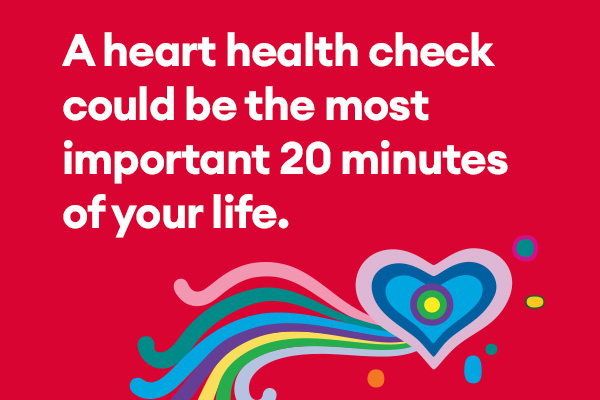Written by Medibank
January 2024
Doing fun things together as a family is a really great way to build positive relationships with each other, but it can also improve everyone’s health.
For example, research shows that a family-based approach can significantly improve risk factors for heart disease, particularly where there is already a history of heart problems in the family.
“In cardiac rehabilitation after a heart event, family support to make lifestyle changes can make a huge difference,” says Katrina McGilchrist, Medibank’s Heart Health at Home’s care coordinator. “Everyone is on the same track and everyone is accountable to each other.”

Parents can be powerful role models for heart-healthy lifestyle
There are several things you can do as a family to improve heart health, but don’t underestimate the impact of simply doing the things you’d like the rest of your family to adopt. It’s about being a positive role model.
For example, research shows that when parents consume the recommended amount of fruit and vegetables each day, their children are 10 times more likely to do that, too.1
On the other hand, children of inactive parents are 6 times less likely to do the recommended amount of physical activity.
This is significant – being physically active in childhood may have a positive impact on heart health later in life.
Similarly, data from AusPlay, the Australian sport and physical activity participation survey, shows that 73 per cent of children with an active parent participate in organised sport or physical activity outside of school.2 Other research shows it’s parents who get active with their kids, rather than in their alone time, who improve their children’s physical activity levels.
6 practical tips to improve heart health for the family
There are some simple yet effective things you can do to make your lifestyle more heart-healthy, from your family’s diet to activity and sleep habits.
1. Plan, cook and eat healthy meals together
Eating a healthy diet in childhood can reduce the risk of heart disease later in life. Research shows that children who cook have healthier dietary habits.
“Letting your children take part in deciding what your family eats, by regularly allowing them to choose a recipe from healthy options, shopping for groceries and cooking the meal together, gives them a sense of ownership and autonomy,” says Katrina. “This can help to develop healthier long-term habits around food.”
Eat meals together as a family as often as you can. Research has shown this is also linked to healthier diets for children and young people.
2. Commit to eating more vegetables
Eating enough vegetables each day can lower the risk of cardiovascular disease by almost 17 per cent.3 If you can help your children establish this habit, they’ll stand a better chance of continuing to do it for life.
The CSIRO suggests trying to eat plenty of vegetables yourself to model the behaviour for your kids. Other things can help your child learn to love and eat more vegetables, including:
- Understanding it’s normal for kids to dislike them. Vegetables are an acquired taste. Acknowledging that it’s natural for children to not like vegetables, rather than expecting them to enjoy them immediately, can make building this habit less frustrating.
- Giving them repeated opportunities to eat different vegetables. It can take at least 10 tries before a child learns to like the taste of a specific vegetable, so keep offering.
- Offering them at lunch and as snacks. Making vegetables available more often throughout the day, rather than mainly at dinner time, can increase both a child’s willingness to try them and how many daily serves they eat.
3. Agree on family screen-time rules and limits
Research suggests that screen time amongst families is creeping up. More than two-thirds of children and young people in Australia are getting too much of it,4 which can have a negative impact on weight and diet, as well as increasing the risk of anxiety and low self-esteem. At the same time, a recent survey shows adults in Australia spend 150 minutes every day, on average, looking at their phone,5 but for some, it’s much more.
Just like other healthy behaviours, research shows a connection between how much screen time parents partake in, and how much time their children spend on screens. Aim to agree on and actively practise whole-family screen-time rules and limits. Find alternative activities – ideally active ones – to fill the gaps.
4. Be active together
As the research shows, it’s not just you being physically active that’s important for encouraging your kids to move more – seeing you in action plays a role, too.
“One way to be more active as a family is planning active weekends,” says Katrina. “For example, you could go ten pin bowling instead of going to see a movie.”
Encourage your kids to brainstorm and choose these activities.
Katrina says there are also things you can do to help turn daily movement into a habit, for your kids. “When you can, try to walk places rather than taking the car. Or park further away from the school gates in the mornings and afternoons, so you can walk to and from school together. That extra 10 or 15 minutes of walking a couple of times a day can make a real difference for everyone.”
And think of ways to make moving fun. “One idea,” says Katrina, “is to set up a family competition around who can take the most daily or weekly steps. Children tend to be motivated by the idea of winning, or at least doing better than a sibling or a parent.”
5. Follow a family sleep routine
To encourage better sleep, set some age-appropriate sleep and wake-up times as a family, and do your best to stick to them, even on weekends.
On those days where you can’t avoid a late night, don’t stress – but stick to your regular wake-up time. It’s getting up at the same time each day, rather than getting to bed on time, that plays a bigger role in regulating the body’s clock that controls sleep.
Poor sleep has been identified as a risk factor for heart disease. Worryingly, at least 40 per cent of adults in Australia aren’t getting adequate sleep regularly. Around 25 per cent of 12-15 year olds and 50 per cent of 16-17 year olds don’t get enough sleep on school nights, either.
6. Don’t forget to prioritise your own heart health
If you’re aged 45 years or over (or over 30 years for Aboriginal and Torres Strait Islander peoples) and you’ve never had a Heart Health Check or it’s been 2 years since your last one, book an appointment with your GP. A Heart Health Check takes just 20 minutes and will help you identify steps you – and your family – can take to improve heart health. Heart Health Checks are free of charge if you visit a GP clinic that bulk bills this service.

Complimentary health checks now available
We're always looking for ways to help our members, that's why we are trialling complimentary health checks over the phone with Registered Nurses^ for members with Hospital cover.+
Read more about heart healthy living
Looking for something else?
Visit Heart health for more information.
Things you need to know
1 Coto et al, Parents as role models: associations between parent and young children’s weight, dietary intake and physical activity in a minority sample; Matern Child Health J 2019 Jul;23(7): 943-950; retrieved July 2023
2 Clearinghouse for Sport; Engaging parents in sport; retrieved July 2023
3 Heart Foundation; Key Statistics: Cardiovascular Disease; retrieved July 2023
4 Active Healthy Kids Australia; Reboot! Regaining Physically Active Lives; retrieved July 2023
5 Finder; Anti-social media: The shocking amount of time Australians spend looking at their phone; retrieved July 2023
^ This health check service is being delivered by Amplar Health. Amplar Health is a business of Medibank Health Solutions Pty Limited (ABN 99 078 934 791), a member of the Medibank group of companies.
+ Members must be +18 years and have Hospital cover. Members with Overseas Visitor Health Cover, Working Visa Health Cover and Overseas Student Health Cover (OSHC) are not eligible.
While we hope you find this information helpful, please note that it is general in nature. It is not health advice, and is not tailored to meet your individual health needs. You should always consult a trusted health professional before making decisions about your health care. While we have prepared the information carefully, we can’t guarantee that it is accurate, complete or up-to-date. And while we may mention goods or services provided by others, we aren’t specifically endorsing them and can’t accept responsibility for them. For these reasons we are unable to accept responsibility for any loss that may be sustained from acting on this information (subject to applicable consumer guarantees).










